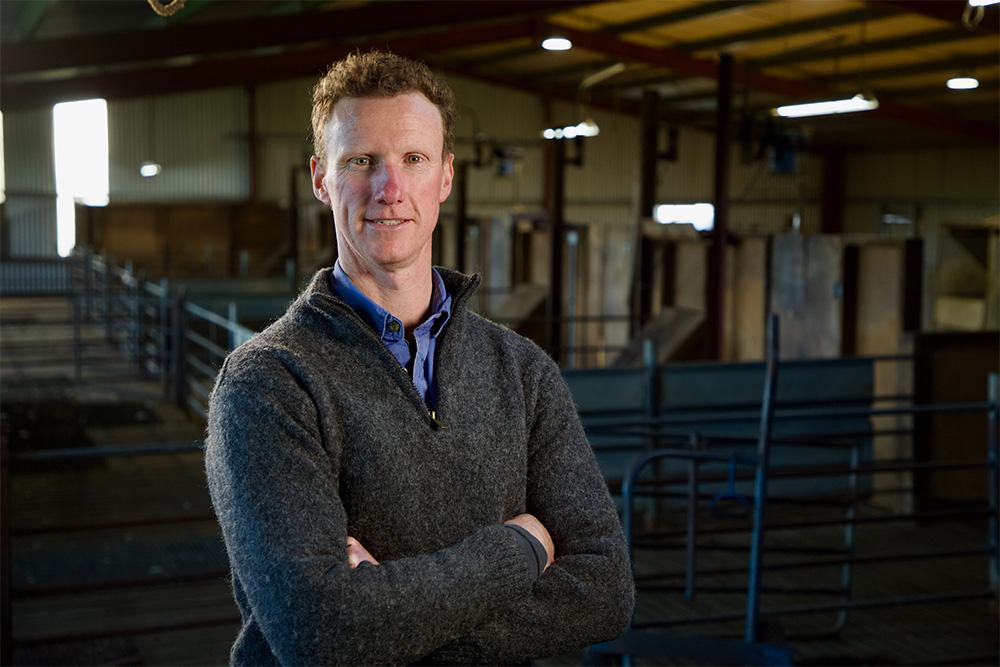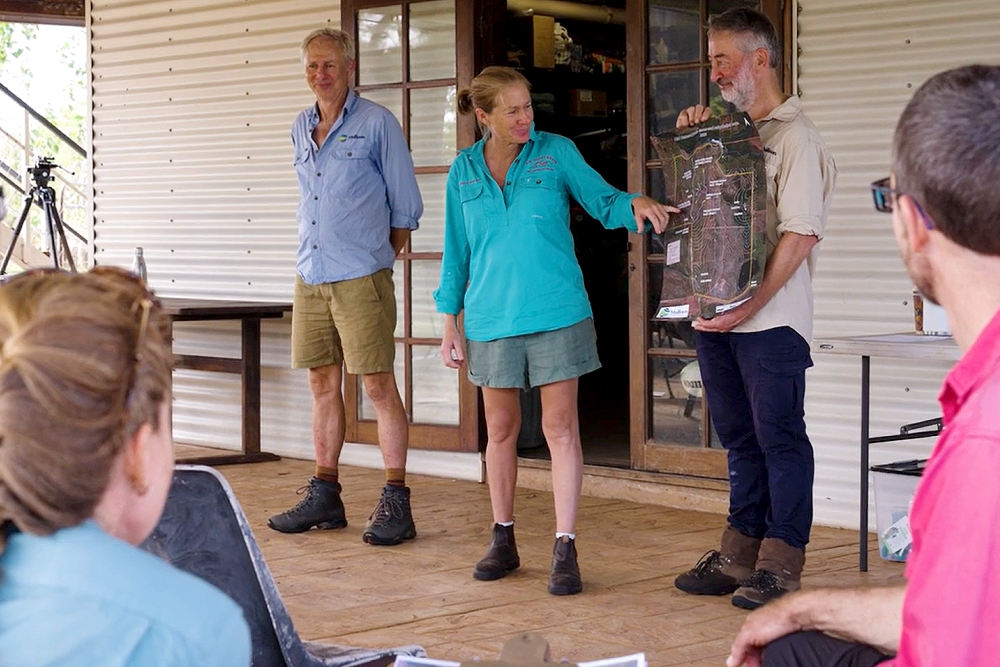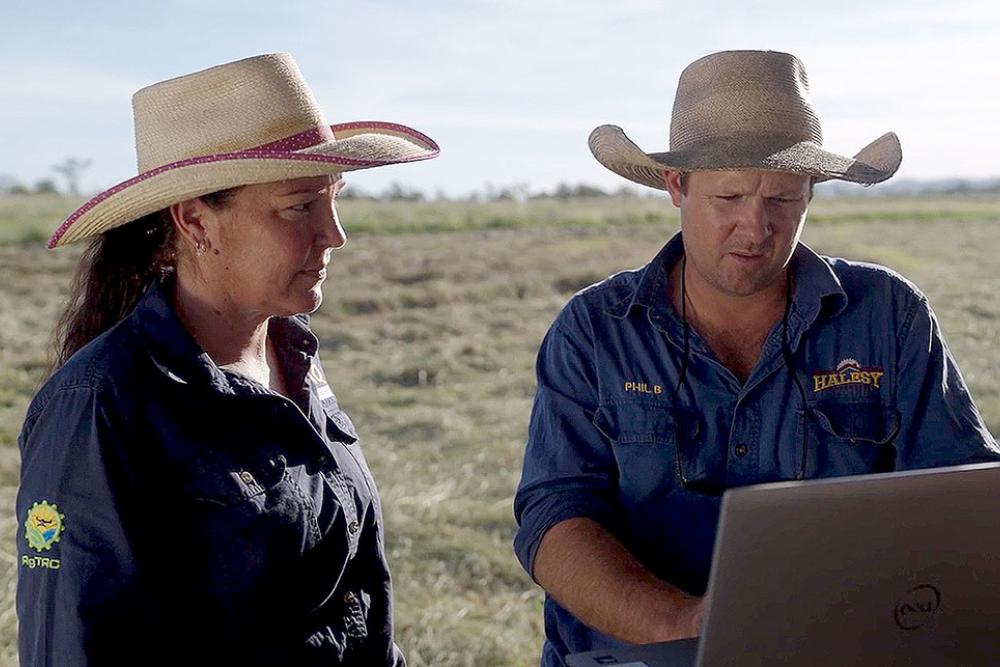Dr Raelene Ward is a proud Kunja woman and the Knowledge Broker, First Nations Engagement at the Southern Queensland Northern New South Wales Drought Resilience Adoption and Innovation Hub (SQNNSW Drought Hub). In her role, she is leading a transformative approach to drought resilience, one grounded in cultural respect, collaboration, and community voice. Her role involves listening deeply, understanding local histories, and translating national and regional initiatives into meaningful local engagement.
“Collaboration is key to better understanding First Nations people, what are their stories and how we can support their participation in conversations around drought, climate change, water,” says Raelene.
Her work supports a range of projects such as food sovereignty initiatives, where First Nations communities and school groups explore sustainable growing practices and water access. These projects go beyond technical solutions, incorporating cultural knowledge and community-led design.
Elizabeth Adams, a key community partner, emphasises the importance of having both cultural knowledge and community engagement, “You need both to be able to hear what the real issues are, but also getting the real solutions.”
Dr. Ward also collaborates with First Nations farmers and organisations to co-design projects that reflect community priorities, such as improving water access, supporting native food initiatives and engaging First Nations youth on Country.
By embedding herself in communities and empowering the voices of those she works closely with, Dr. Ward is helping shift the narrative around drought resilience. Her work ensures that First Nations knowledge is not only acknowledged but actively informs strategies for sustainable land and water management.
“Don’t make decisions for us without us. It’s about being inclusive and let us bring some of the solutions to you”, says Adams.
Through her leadership, the SQNNSW Drought Hub is not only contributing to building resilience, but also, she hopes, reconciliation. Ensuring First Nations knowledge and voices help shape the future of drought preparedness across the region.
See more about Raelene’s work as the Knowledge Broker, First Nations Engagement, at the SQNNSW Drought Hub.
The SQNNSW Drought Resilience Adoption and Innovation Hub, led by the University of Southern Queensland, receives funding from the Australian Government’s Future Drought Fund.
7 May 2025
Video duration: 6 mins 53 secs
Introduction
This is the transcript of a video case study produced by the Australian Government's Future Drought Fund (FDF). The video features Dr Raelene Ward, Knowledge Broker for First Nations Engagement at the SQNNSW Drought Resilience Adoption and Innovation Hub, explaining how she plays a vital role in fostering culturally grounded collaboration, amplifying First Nations voices, and bridging traditional knowledge with contemporary drought and climate resilience efforts. This project was funded by the Australian Government's Future Drought Fund as part of the Drought Resilience Adoption and Innovation Hubs program, and delivered by the University of Southern Queensland.
Learn more about the Future Drought Fund and Southern Queensland and Northern New South Wales Drought Resilience Adoption and Innovation Hub.
Transcript
Recording begins [0:00]
Dr Raelene Ward [0:31]
My name is Dr. Raelene Ward. I'm the knowledge broker for First Nations engagement of the Southern Queensland Northern New South Wales Drought Hub. My role is to engage all traditional owners, custodians, Aboriginal, First Nations people across our entire hub. Collaboration is key to better understanding First Nations people, what are their stories and how we can support their participation in conversations around drought, climate change, water. It's key for building relationships. It's key for engagement. First Nations people are the first scientists, not only agriculturists, but they have a lot of knowledge, they have a lot of experience, and First Nations people want that collaboration. They want to be able to see you come out on their country and build better relationships.
Ben Lyons [1:31]
Raelene comes from our region and she performs this really key role of being a translator, if you like, between national and local initiatives, that bridge is often the biggest stumbling block. It’s a brokering role in the true sense of the word, she's bringing people together.
Elizabeth Adams [1:46]
Having people with that cultural knowledge and community engagement. You need both to be able to hear what the real issues are, but also getting the real solutions.
William Haupt [1:59]
Traditionally, see when passing through country, there was protocols and customs that we must always follow, and one of them when we're crossing through someone else's boundaries is to set a fire and let off a smoke signal to catch the attention of the mobs that live in that area and then they'll guide us through that country and they'll share us all the knowledge and the culture of their area until we get through to the other side. So if you look at a modernised version of what that is, is what Raelene is doing, she’s explaining and helping people be able to have that voice to open up and share the information from that community with everybody else.
Dr Raelene Ward [2:36]
When I first came into this role, I did some research myself to better understand what people were talking about, what was the language they used, what was done previously around drought and when we talk about drought resilience or we talk about innovative practices or techniques on behalf of First Nations people, we need to come from conversations about what is important for them. from that community in the region. What are the issues for them, you know, is it health related? Is it employment? Is it about being acknowledged as local people? How do we support the coming together and reconciling, misunderstandings or, negative connotations around First Nations people? You need to be embedded in the community, to understand the dynamics of where you visit. You need to understand the history of that Aboriginal community. Even though they share very similar stories, the impacts might be very different historically for them.
Elizabeth Adams [3:53]
We were approached through Goolburri to do a research project around food sovereignty. Raelene, with her knowledge from the Drought Hub was just amazing. I mean, to me, when I think of growing fruit and veg, it's just a matter of planting something here there, but she puts a more specific around that, you know like, is it a healthy area? She even talks around water supplies to us. She puts us in that role and that frame of mind that it's more than just setting up a garden bed and putting stuff in it.
Stephen Robinson [4:28]
In Toowoomba, we have a wide range of First Nations people from all over Southwest Queensland, North West New South Wales, so learning about food sovereignty and how they move forward with their own cultural journey is imperative to them having success later in life. So sustainability, education, equity, it all sort of goes hand in hand in regards to that program.
Dr Raelene Ward [4.50]
In our Drought Hub, we have a number of partners, farmers, agencies, organisations that I collaborate with. One of the key ones that I'm very excited about is the relationship that I've developed with a farmer who is non-Indigenous and his wife is Aboriginal. I've been speaking to them for a couple of years now and better understanding, you know, from their perspective what they want to do. They want, drought proof their land. They want better access to water. They want to be to support native foods naturally growing on their property. They want to support young people, you know, particularly those that are, disengaged and at risk of suicide. I've been able to, you know work with the property owners to develop a project engaging Traditional Owners on country. Knowledge Broker, you know, in my terms, is very key to First Nations engagement. It's important to the work that I do in the Drought Hub. Everything has a purpose and a place.
Elizabeth Adams [6:05]
Don't make decisions for us without us.It's about being inclusive and let us bring some of the solutions to you, which then should drive, the policies that people are trying to, you know, put out there.
Dr Raelene Ward [6.19]
We're not only about building relationships and connections, you know, for people within my hub, but it's across the entire country. We can do that comfortably and naturally.
So I want my role to be able to support the voices and elevate the stories of First Nations people to see meaningful outcomes and to be able to see change in policy for the future.
Recording ends [6:53]



